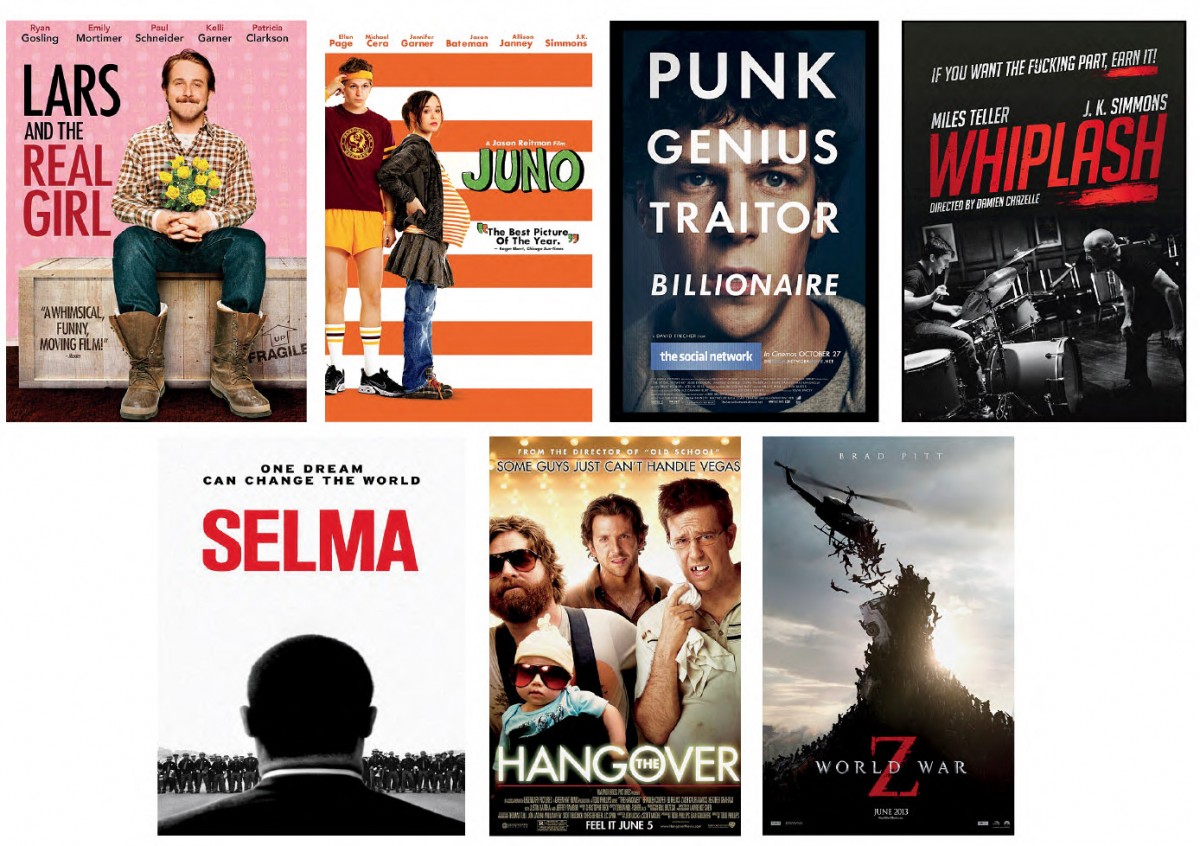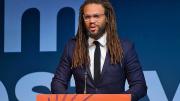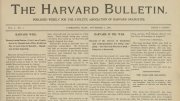Backstage at the Montalban Theater in Los Angeles, Franklin Leonard ’00 takes his catered sandwich to the green room. It’s his party, in a manner of speaking, and the table’s been set with beer and wine and someone else’s preferred brand of bourbon, and has TV actors of varying fame and uniformly good looks seated around it. They’re all on a dinner break before a live reading of “College Republicans,” a screenplay written by Wes Jones that follows a young Lee Atwater and Karl Rove on their 1973 campaign through the South. Leonard—in a blazer and Converse sneakers, his dreadlocks tied back in an elegant knot—retreats to a cluster of chairs to the side, where his team members balance their plates on their knees. The situation is reminiscent of the divide in high-school theater, between the thespians and the techies. “Joining the kids’ table?” his events manager quips, and he nods.
A self-described micromanager, Leonard goes over a few last details: collecting the cast members’ contact information; choosing the house music as the audience files in (“Southern funk. Allman Brothers,” he decides, firmly); drafting introductory remarks. He especially worries that the auditorium full of Hollywood liberals might boo his guests: Alex Smith, the current sitting (and first woman) national chair of the College Republican National Committee, and two of her friends; they’d taken him up on an invitation he had extended on Twitter. “Honestly,” he says, “kudos to her for coming into the lion’s den.”
Despite apologizing earlier for “running around neurotically,” the supremely unruffled-seeming Leonard sits down long enough for a brief interview. “What are your plans?” he asks. “Do you want to be a screenwriter?” Hesitation prompts him to prod, “Oh, come on, you must have designs on something.”
Leonard is used to writers wanting something. If he can, he will help them get it. Actors get more glamor and directors more credit, but he is passionate about spotlighting screenwriters; he seems to believe in pure story, conceived on the page—not through aesthetic or cinematic observation—as the prime mover of filmmaking.He calls himself the writing community’s hype man: “I’m cool with being the Puff Daddy to their Biggie.” And he became that by creating a Black List that people dream of being on.
The Black List 1.0: “A Way to Quantify Heat”
Leonard likes to say he founded the Black List by accident. In December 2005, he was a junior executive at a production company, frustrated that he couldn’t seem to find good scripts. He went through his calendar, pulling the contacts for every executive he had met with that year, coming up with a list of 90. From an anonymous address, he polled them about their favorite unproduced screenplays from that year, and, after tallying the results, sent the numbered list back to them as a PDF under the title “The Black List.” Then he went on vacation to Mexico.
“I went to the resort business center to check my e-mail” for his work account, Leonard recalls. “And there were 75 e-mails where the list had been forwarded back to me. People were saying, ‘This list is amazing! Where did it come from?’” He kept quiet about his involvement, but a few months later, an agent calling to promote a client’s script came up with a bald-faced lie that made Leonard realize that he’d started something big: “Listen, don’t tell anyone, but I have it on good authority that this is going to be number one on next year’s Black List.”
“A) I had decided I wasn’t going to do it again because I was afraid of getting fired, and B) even if I was, it’s a survey, so six months out, there’s no legitimate authority on what’s going to be on the list—certainly not number one,” Leonard says. “He was using the possibility of the thing as a tool to sell his client.”
That incident convinced him to continue compiling his survey. People began to pay attention in 2008, when two scripts that had been on the 2005 roster, Lars and the Real Girl and Juno, were nominated by the Academy of Motion Picture Arts and Sciences for best original screenplay. Black List titles have been made into movies as various as The Social Network, Whiplash, Selma, The Hangover, and World War Z. Four of the last six Oscars for best picture, and 10 of the past 14 for adapted or original screenplays, went to films highlighted on the Black List. As the announcement of the Black List became an anticipated annual event, Leonard expanded his survey’s scope. He now polls some 550 to 650 people, with a response rate of roughly 50 percent. “The idea of a PDF has become adorable,” he adds—scripts on the list are now announced, one by one, on Twitter or through YouTube videos.

The scripts for Lars and the Real Girl (2007) and Juno (2007) were at the top of the first Black List, in 2005. The List has since included celebrated veterans like Aaron Sorkin (writer of The Social Network) and relative unknowns like Damien Chazelle ’07 (of Whiplash).
Beyond trade publications like Variety and The Hollywood Reporter, media outlets like The Los Angeles Times and Slate took notice, eager to peer into this window on the industry’s conversations: zombies were in, then out again; biopics have consistently done well, as have making-of stories about beloved classics like the Muppets or Jaws. At one point, even Mother Jones joined in the fun of speculating about what titles might one day come to theaters.
Leonard takes care to emphasize that these are not the best unproduced screenplays but the most liked. The distinction emphasizes that the list is not about quality per se—or some external, aesthetic standard—but about the gut: these are the stories that a critical mass found moving, thrilling, or fun. It also suggests the list’s true utility: taking the temperature of Hollywood’s excitement. The first participants may have praised the list less for its new titles than for those they recognized. Aphorisms abound about the industry’s conservatism: executives are said to spend their days saying “No, no, no, and no,” then going to lunch; saying yes will get them fired. Nancy Oliver told Entertainment Weekly in 2008 that her romantic dramedy about a man and a sex doll, Lars and the Real Girl, “had been making the rounds for a few years, but it was still an invisible property. The Black List changed all that. It gave permission for other people to like it.” Leonard’s survey had an observer effect. Measuring—and thus, cementing—consensus, it became a Hollywood fixture.
The awards-season success of Black List films sits next to a more sobering statistic: of the 1,067 screenplays highlighted in the past 11 years, 322 lived to become movies. Even so, some of their authors have parlayed the attention into jobs on massive studio franchises. Brian Duffield, of the Black List class of 2010, earned his first writing credit on the young-adult blockbuster Insurgent; Marvel Studios hired Chris McCoy (named to the Black List three times) for Guardians of the Galaxy, and Stephany Folsom (whose script on Stanley Kubrick made the 2013 list) for their next Thor sequel. Josh Zetumer, a former lawyer’s assistant, found himself writing on-set dialogue for a James Bond movie and, later, the script for a Robocop reboot. No one on the List is pulled from total obscurity; scripts still need to reach the right desks—and enough of them. But the List can bottle the otherwise transient buzz around a writer; it makes the glow last a little longer. As Zetumer told The Boston Globe in 2012, “The Black List is a way to quantify heat.” Making the case for an unproven talent or a script written on speculation was much harder before it existed. The Black List gave people something to point to.
The Outsiders’ Insider
Leonard has always thought of himself as an outsider—or at least, he concedes, someone who’s gotten access to, but not comfortable with, the inside. This is partly the product of a roving, army-brat childhood: born in Hawaii, he lived in El Paso, Fort Leavenworth, Heidelberg, and Frankfurt before his family settled in Columbus, Georgia. Leonard’s mother was a schoolteacher and his father a colonel and surgeon who, upon retiring to civilian life, specialized in neonatology. They were strict, he says, but “it was also a very loving home. It’s not at all that sort of cliché military upbringing.”
As a child, he had a stutter, which he outgrew, and a love of soccer, which he did not. (On weekends, he plays in a Santa Monica pick-up league called Untitled Football Project, as a defender; in spare moments he reflexively checks on his fantasy league, on his phone.) Adding to his shyness: “I was a giant nerd. I was Steve Urkel [from TV’s Family Matters], basically. People called me that all the time in high school, and I was like, ‘That’s so mean, that’s not true,’ but in retrospect? Not inaccurate.” He joined the Boy Scouts and captained the math team; his senior year, the state senate commended him for, among other achievements, perfect SAT scores.
At Harvard, Leonard got involved with the Institute of Politics—not the Lampoon, the usual hangout of the Hollywood-bound. Still, in hindsight, it’s possible to see the roots of his interest in the behind-the-curtains systems that support creativity. He was publisher of The Harvard Advocate in 1999, and wrote his social-studies thesis on liberal democracy and slam poetry. During summers interning in New York City, he explains, venues like the Nuyorican Poets Cafe were an attractive hangout for a kid under 21.
His path to Los Angeles took a few detours through politics and media: back then, law school seemed basically inevitable; Leonard imagined that he’d then pursue a career at the Southern Poverty Law Center. After graduating from college, he worked on the congressional campaign of John Cranley, J.D. ’ 99, M.T.S. ’00, his mentor and onetime teaching fellow for a history class on the Warren Court. (Leonard says, of that time, “It was great. I mean, it was weird.” They were being taped for the MTV reality show True Life; the episode aired after the election, which they lost.) He then auditioned to be a video deejay, but, failing that, went to Trinidad for seven months, where he observed the aftermath of the country’s contested parliamentary election and wrote for its oldest daily paper. Returning to the States, he took a consulting job at McKinsey & Company. In the months following the September 11 terrorist attacks, though, the firm laid off his entire recruitment class with five months’ severance. Leonard spent much of his time watching rented DVDs before heading west, to Los Angeles, where a friend tipped him off to an open assistantship at the Creative Arts Agency. He was hired the next day.
Leonard was working at Leonardo DiCaprio’s company, Appian Way, when he sent out the first Black List in 2005. After he sent out his second list, the Los Angeles Times published a story identifying him as its creator. Though he considers himself naturally introverted and a homebody at heart, he began being invited to speak at colleges, panels, and festivals as an industry sage.
“It’s still sort of surreal. I think that the thing that gets me invited to speak is that I’m constitutionally unable to bullshit.”
“It’s still sort of surreal. I think that the thing that sort of gets me asked back or gets me invited to speak is that I’m constitutionally unable to bullshit.” Proving that, he continues: “And I think there’s some amount of, like—from a casting perspective—I’m a black guy with dreadlocks, and that person with the Harvard background talking about the economics of the industry. It’s fundamentally interesting.” Though he has grown used to public speaking over the years, he still vomited before giving a speech at Fast Company’s 2010 Most Creative People in Business conference: “Ray Kurzweil was right before me,” he explains. “Just to give you a sense of how out of place I was.”
In a video from a more recent speech in New York, on an assigned theme of “How to Change the World,” Leonard looks faintly green. (He has been described as soft-spoken, which is not quite right; his talk is sometimes boisterous and always fast, a rate accelerated by nerves.) He piles on self-deprecating asides, some planned, others clearly ad-libbed, almost under his breath. Issues more pressing than showbiz weigh on his mind—protests in Baltimore, an earthquake in Nepal—and they foreground his remarks about the Black List’s unlikely successes. This goes some way toward explaining his tone when he tells the audience:
Here’s the thing. I didn’t do anything with those scripts. I didn’t write them, I didn’t direct them, I didn’t produce them, I didn’t finance them, I didn’t act in them, I didn’t run cable or post lights on set. I didn’t even give them from one person to another, who would go and do those things. All I did was change the way people looked at them. But again—and I really cannot stress this enough—I did not do a damn thing to make them.
In that moment, Leonard named the strange truth of his career: that until a few years ago, he was best known for devising an instrument to measure others’ opinions.
Modernizing the Dream Machine
If the Black List’s origin tale starts with serendipity—its founder stumbling across a once-invisible need—its next chapter has a more deliberate arc. In 2009, Leonard met software engineer Dino Simone through a mutual friend, and they struck up a conversation about the difficulty of finding worthy material for film development. (Simone legally changed his surname from Sijamic in 2016.) “Coming from a very different world, where essentially everything that I did was about automating, making things faster or more efficient—when he told me about these problems, that was interesting,” Simone says. “Because they can definitely be solved. It’s just a matter of time, and going about it in the right way.”
Their solution was a website they dubbed “a real-time Black List,” an online hub where members—agents, managers, producers, financiers, directors, and actors—could find promising projects. Writers pay a monthly fee for the Black List to host their scripts, then choose from some 1,000 tags to index it; these describe genre (“alien invasion,” “prehistoric fantasy,” “heist comedy”), theme (“self-discovery,” “guilt/regret”), and other elements (“combat with weapons,” “$1-10mm [budget],” “twist/surprise ending,” and “female protagonist [diversity]”). Writers can then boost their visibility by paying for evaluations from the site’s stable of anonymous professional readers, who give each script a numerical rating and brief comments about its strengths, weaknesses, and commercial viability. Highly rated scripts are featured in the website’s “top lists,” and highlighted in e-mail newsletters.
Simone's tech-world optimism was a natural complement for Leonard’s McKinsey-honed mentality: both were confident that they could modernize the Hollywood dream machine. The Black List embodies a philosophy: that through savvy entrepreneurship, capitalism can encourage not just efficiency, but meritocracy, in show business. That the system could be tinkered with to yield higher-quality entertainment. That, if engineered properly, the marketplace could identify the best material, to the benefit of all—financiers, creatives, and audiences. It’s a theory of industrial art-making that’s powerfully attractive in a business as resource-intensive, risk-averse, and data-hungry as Hollywood.
The website also included a component that catered to this abiding interest in taste by numbers. Leonard had followed the Netflix Prize—a contest to come up with better movie-recommendation software—with interest, and had been impressed by Amazon’s system ever since it suggested the books of Polish journalist Ryszard Kapuscinski, who subsequently became “my favorite writer of all time.” After Simone built their site’s first algorithm, Leonard enlisted the help of his college roommate, Sean Owen ’00, who’d worked at Google and gone on to found his own company, Myrrix, “so we have a recommendations algorithm that is far more powerful than it has any right to be, for a company as small as we are,” Leonard admits. “If I’m being honest, it’s still the most underutilized part of the site.” He suspects that Black List members resist the idea that their preferences can be predicted. “Everyone wants to believe their taste makes them special—like, who could possibly divine what I will like?” (He doesn’t state the irony: that the annual list succeeded, at least in part, because it reassured gatekeepers that their tastes were shared by their peers.)
The co-founders launched the Black List site in October 2012. Now, they employ several full-time staff members who assist in its various projects and day-to-day operations. With no fixed hours or offices, the company allows time and flexibility for other pursuits—everyone, with the probable exceptions of Leonard and Simone, is an aspiring writer. The small, close-knit team meets at cafés, in each other’s kitchens, or at Soho House, the private club in West Hollywood where Leonard is a member. Free to be a remote CEO, he says he seizes the opportunity to travel while he’s still unmarried and doesn’t have kids. In 2015, he was on the road 120 days, attending film festivals, entrepreneurship conferences, and other events from Oaxaca to Toronto to Nairobi; even when he’s home in Los Angeles, he spends much of his time stuck in transit, and while stuck in traffic, conducts phone conferences and listens to podcasts—and, more recently, the cast recording of Hamilton (a musical that happens to be deeply concerned with the power of writing).
Initially, some accused the Black List of piling on in the already-crowded arena of reading services and competitions seeking to make money off luckless hopefuls. From this view, offering the possibility of exposure is akin to selling lottery tickets. The skepticism has faded, though, in part due to Leonard’s readiness to answer pseudonymous critics on online message boards and Reddit question-and-answer sessions, often late at night and for hours at a time.
The site has been popular enough that it recently raised fees to cope with rising demand, promising to give out more coupons for free hosting and evaluation to compensate. More significantly, the founders also added a new mechanism to their marketplace. Scripts receiving high scores from paid readers will earn a few months of free hosting and some free evaluations. The best material could go on a hot streak, entering an endless loop of free reads, racking up enough high ratings to be highlighted. This may keep talented writers from being scared off by the price hike; it also keeps the strongest submissions from languishing simply because their creators couldn’t afford to invest in more attention.
So far, a few scripts have attained sufficient escape velocity to break through to the vaunted annual list: Justin Kremer’s “McCarthy,” about the Red Scare—“When it first came through the site with really good reviews I was convinced someone was playing a practical joke on me. It was just way too on the nose,” says Leonard—and Jason Mark Hellerman’s “Shovel Buddies,” about a group of twenty-somethings fulfilling the last wishes of a friend with cancer. Both were unknowns before joining the site: Kremer was living in Staten Island with his parents; Hellerman had a desk job routing calls for a producer. The writers crowned number one on the 2014 and 2015 lists were also discovered by their reps through the site, Leonard adds. But his favorite success story—“the craziest, and probably the one I’m most proud of”—doesn’t share that straightforward trajectory; it doesn’t involve the annual list at all. In 2012, Ruckus and Lane Skye, a husband-and-wife team based in Georgia, uploaded a thriller that eventually caught the eye of a film executive in Abu Dhabi. The Arabic-language movie that resulted, Zinzana, was reportedly the first genre flick ever made in the United Arab Emirates.
According to Scott Myers, who runs the popular screenwriting blog “Go Into the Story” (which started in 2008, and became the Official Screenwriting Blog of the Black List in 2011), the Black List is the latest shift in a longer historical change in Hollywood: “It used to be a closed-loop system,” he says, one that expanded periodically to recruit writing talent—mostly journalists and novelists; the market for scripts written on speculation boomed in the 1980s and 1990s, but even that was built on personal connections or film-school networks.
These days, says Leonard, people take one of two routes: “You enter the Nicholl Fellowship, which is the Academy’s screenwriting competition, and the biggest screenwriting competition on earth, and if you place in the top 30, somebody will probably call you. Or you move to L.A. and you get a job at Starbucks and you network until somebody pays attention to you.” But, he continues, warming to his subject, “If you’re a married man with a mortgage in Raleigh, North Carolina, you’re a terrible father if you pick up your family and move them to L.A. because you want to figure out how to be a screenwriter. If you’re a single mom on the South Side of Chicago, that’s not an option for you.” For these hypothetical talents, he maintains, his site’s hosting and evaluation fees are a bargain.
The site tends to pitch itself less as real-time analog to the annual list, and more as a place for new writers to be discovered, and for established writers to promote themselves. (Members of various English-language Writers Guilds can list their work for free, and get other services at a discount.)
All can submit their work to various contests: usually, the site’s algorithm determines the strongest scripts for a shortlist, and then those finalists submit personal statements and résumés. So far, the prize opportunities have included deals with studios like Warner Brothers and the Walt Disney Company, fellowships with the National Football League, Google, and the Hasty Pudding, and spots in screenwriting labs.
Kristina Zacharias, working full-time as an administrator at New York University, considered herself a “hobby writer” until recently, when she won a fellowship to attend the Sundance Film Festival under the wing of a prominent producer, and a spot in a workshop at the women-centered Athena Film Festival. Since then, she has been working on a film treatment with a producer she met at Sundance, and taking calls from potential managers. “When I decided to take it seriously, the Black List was the way that I actually could get a little bit of traction,” Zacharias says. And, she adds, Leonard has sent introductory letters on her behalf to agencies and festival labs.
“I have no idea how to thank him—he keeps saying, ‘This is what we do,’” she reports over the phone, sounding elated. “And I’m like, ‘No! No one knows that this is what you do.’ This is like you’re in this select, members-only club, and you have access to all these great resources, and I mean that, to me, is like the real value. Once you’ve sort of proven that you’re serious, the Black List will do anything that it can to help.”
Cinderella stories like hers are tantalizingly rare. But the Black List may have a subtler, more diffuse effect on people working beyond Hollywood, through the happy hours it organizes in some dozen cities, hosted by local volunteers. Shelley Gustavson has found collaborators at the Chicago events, but says the aim is to build camaraderie among screenwriters: “We want to get them away from their laptops, and help them feel supported.” While the Chicago happy hours have been drawing some 150 attendees, the New Orleans happy hour (held at a supposedly haunted converted mansion) draws a crowd a third that size on a good night, according to actor Hunter Burke. “We’re trying to be part of the community that’s trying to bring back a local film movement,” says Burke, who hopes to make his next movie on the cheap, in his city, with Louisiana-based financiers. He thinks the Black List’s name will attract a critical mass. “Really, it was a no-brainer to put them at the forefront of the community-building exercise we should start doing here.”
The range of Black List activities has also grown to reach an audience far broader than its core constituency. These include the “Black List Live!” staged readings of still-unproduced scripts from the annual list. Leonard has also, in effect, become a part-time radio host and producer, putting out a weekly podcast of interviews and full-cast table reads of scripts from the site. “The podcast definitely represents a shift, I’d say, from the Black List brand being a sort of industry-facing thing, or sort of B2B, to us being consumer-facing, so what I’d say is that we’re sort of a B2B2C.” He pauses. “And it’s strange for me, I’m not going to lie. I’m sort of fundamentally uncomfortable with the idea of being in the public eye, period. That transition has been an awkward one for me.”
“We find the best material first, and have access to most of it. It would be cool if we could put money behind the stuff that we identify as being good.”
Within the next year, the company’s ventures are set to expand even further. The site just rolled out a social feature that enables writers to associate personal profiles with their scripts, so industry members can search for people, as well as for material; Leonard hopes this will particularly help women and people of color to promote themselves as diverse talent. He also plans to raise money for a film fund, so the business can start financing projects. To his mind, “We find the best material first, and have access to most of it. It would be cool if we could put money behind the stuff that we identify as being good.”
Asked about their long-term ambitions for the Black List, the co-founders often point to AngelList, a website that matches startups, investors, and job-seekers. But when they’re feeling more expansive, they say they’d like to be the “Google of scripts.” That suggests an ambition to make the Black List not merely one resource among many, but the default. Theirs would be the most comprehensive, specific, and reflexively trusted tool for summoning—instantaneously—whatever screenplay any asker could think to ask for.
“It’s Supposed To Be a Movie”
Wes Jones never considered himself especially political. But like many Americans circa 2008, he got caught up in election excitement—the punditry, polls, and prognostications—such that when it ended in November, he says, “There was a little void.” A documentary about Lee Atwater then airing on PBS offered first a kind of methadone, and then inspiration for his next screenplay. “College Republicans,” imagining the road trip taken by the young Atwater and fellow Young Republican Karl Rove, got Jones an agent and manager. His reps pushed the script onto the desks of various studios and production companies throughout January 2010, and in March flew him out to Los Angeles for meetings. Jones was escorted through what he dubs “the bottle-of-water tour,” a courtship ritual befitting a desert city: the debutant talent leaves each office with a bottle of water in hand, and the hope of work in his heart. By midsummer, he’d snagged several assignments: a deal with Warner Brothers, a book-adaptation project.
For Jones—Indiana-raised, New Jersey-based, and working low-level jobs on the fringes of indie filmmaking for more than a decade—“College Republicans” opened the door to the wider industry; the Black List, in naming his script number one in December 2010, gave his arrival some real fanfare. “I’m saying the same things. I have the same ideas. I am the same guy I have been for years, trying to do this stuff—but all of a sudden, people care,”he says, chuckling and chagrined. “Because, you know, I have backup. I’m on the Black List. It creates a status—and a reputation, in fact—where none was before.” At the time, he didn’t believe it when a Sony executive told him, “You know, you’re going to get work off this for years.” But when his agents put him up for a staff job on the new cable drama Billions, “What did they send, in 2015? ‘College Republicans.’”
Even as that screenplay brought its creator steady success as a writer-for-hire, the project itself stalled. Actors were attached, then detached; money was hard to come by. Jones still remembers one time when the pieces seemed, finally, to fall in place—the production schedule was set; they were hiring crew and renting offices—and how the filmmakers waited at the bank for a wire transfer that never came: “That’s indie financing for you,” he says. “It happens more often than you realize.” Then he adds: “No, it sucked. It sucked. It was a heartbreaker.” To Jones, “The script is just a map. It’s not an art form in and of itself. It’s supposed to be a movie.”
Though the Black List had long pushed for a live reading of his script, Jones and his collaborators had said no until recently, worried that it might complicate an already dicey development process. This time around, with the director and lead actors seeming fully committed, it felt safer; the event might even lend the production some momentum, keeping it on the industry’s radar. It would be many months before Jones’s scenes would play out on-screen, but the performance made his script, briefly, “a live, breathing thing.” Introducing it, Jones told the audience that he had never heard his words spoken aloud before the afternoon’s rehearsal.
“College Republicans” played well in the room. Even in 2016, when Karl Rove has somewhat faded from public consciousness, the recent primaries have lent new weight to the narrative of a political party remaking its identity, and young men with outsized dreams are never out of style. This was what the industry, circa 2010, dreamed of making: a well-balanced script that, for all its scheming and swearing and PG-13 sexual content, seems strangely wholesome in its eagerness to please, its efforts to give a little something to every kind of viewer. The power struggle is intercut with slapstick comedy, romance, and a heist. With its focus on character over ideology, it does indeed work, as Leonard maintains, as a nonpartisan coming-of-age. Everyone laughed at the right moments, and, after his deft introduction of Alex Smith as the CRNC’s first woman leader, they applauded; no one booed.
At the after-party in the theater’s mezzanine lobby, Leonard quietly went about getting everyone settled, offering congratulations or drinks. Finally, lacking anything else to do but enjoy the celebration, he confessed, “I hate this part. I’m really bad at mingling. This is the part that makes me, like, want to lock myself in a closet somewhere.” He meant it, but no sooner had he said it than the trio of Republicans appeared at his elbow, gesturing toward the famously blue-eyed actress standing within earshot. “We’re obsessed with her,” they said, and without missing a beat, he made the introductions and rotated through their smartphones to take their photos. When the moment no longer needed him, he returned to replaying the night mentally. It went well, he thought, but as ever, “There were a couple of things that could have gone better.“ Rather than name them, he shrugged. “I’m already thinking about the next one, for better or worse.”









